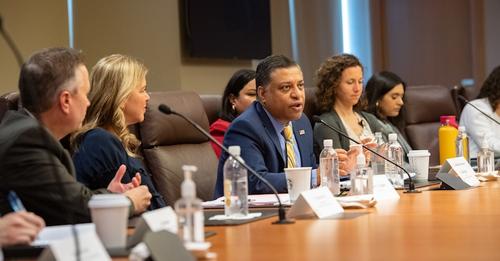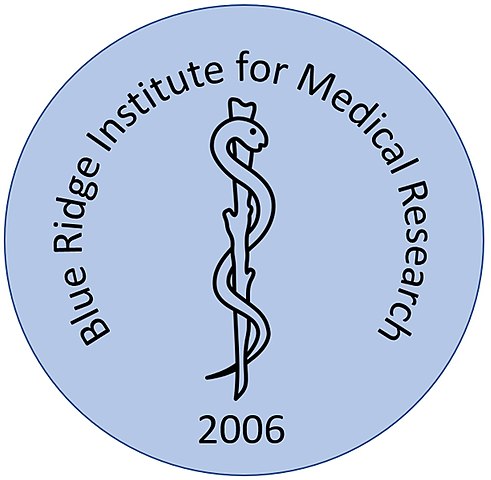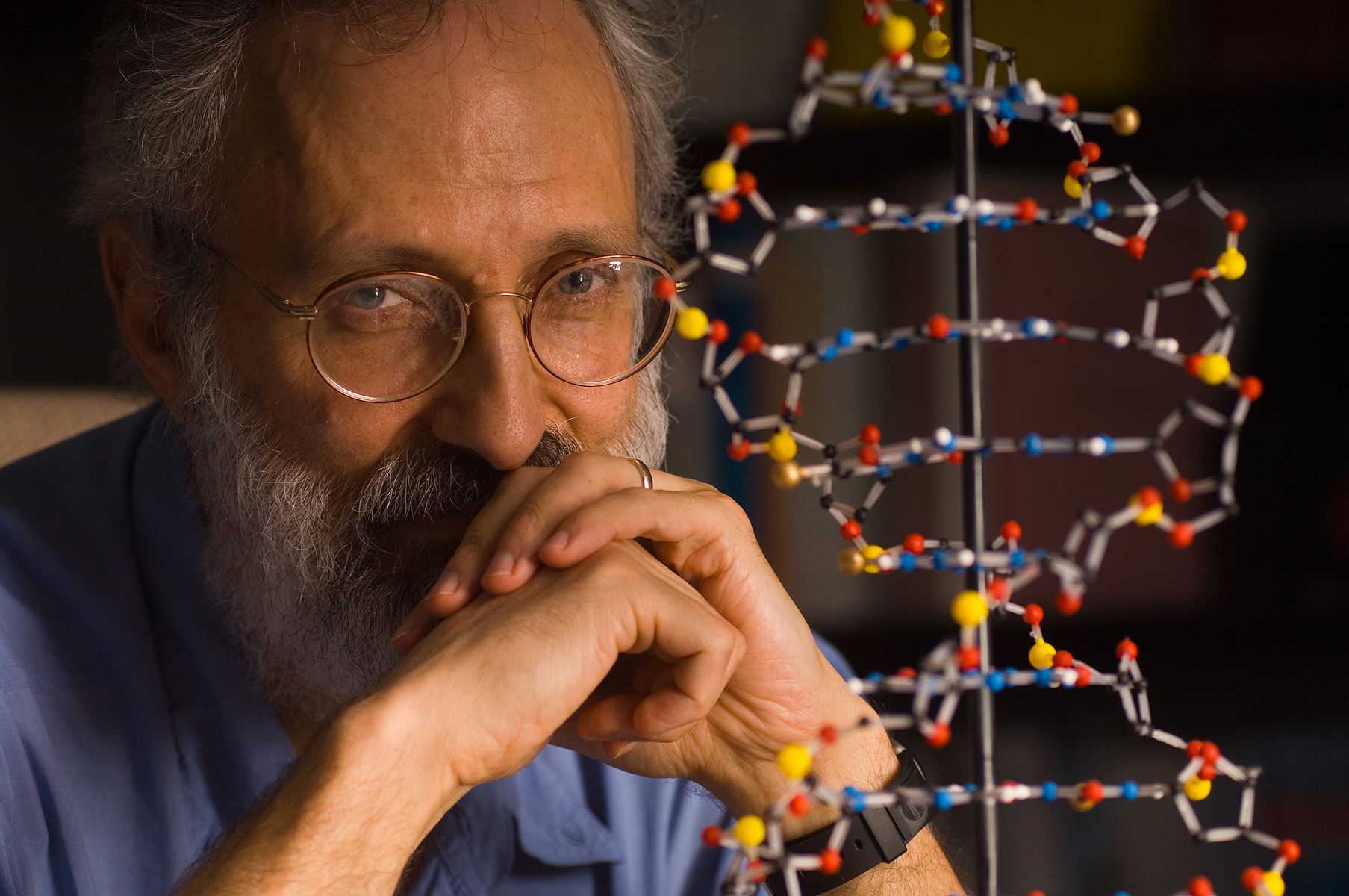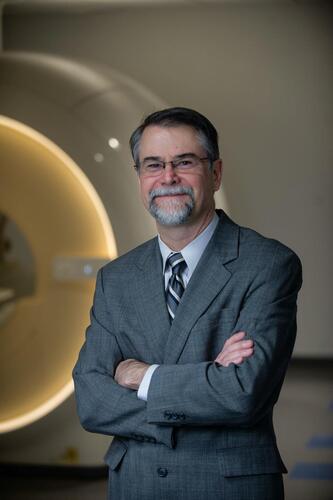Mind Matters
News from the VCU Department of Psychiatry
People, Passion, and Promise
Chair of Psychiatry Dr. Robert Findling discusses the Department’s achievements, past and future
1/9/2025
By: C. F. Orrison
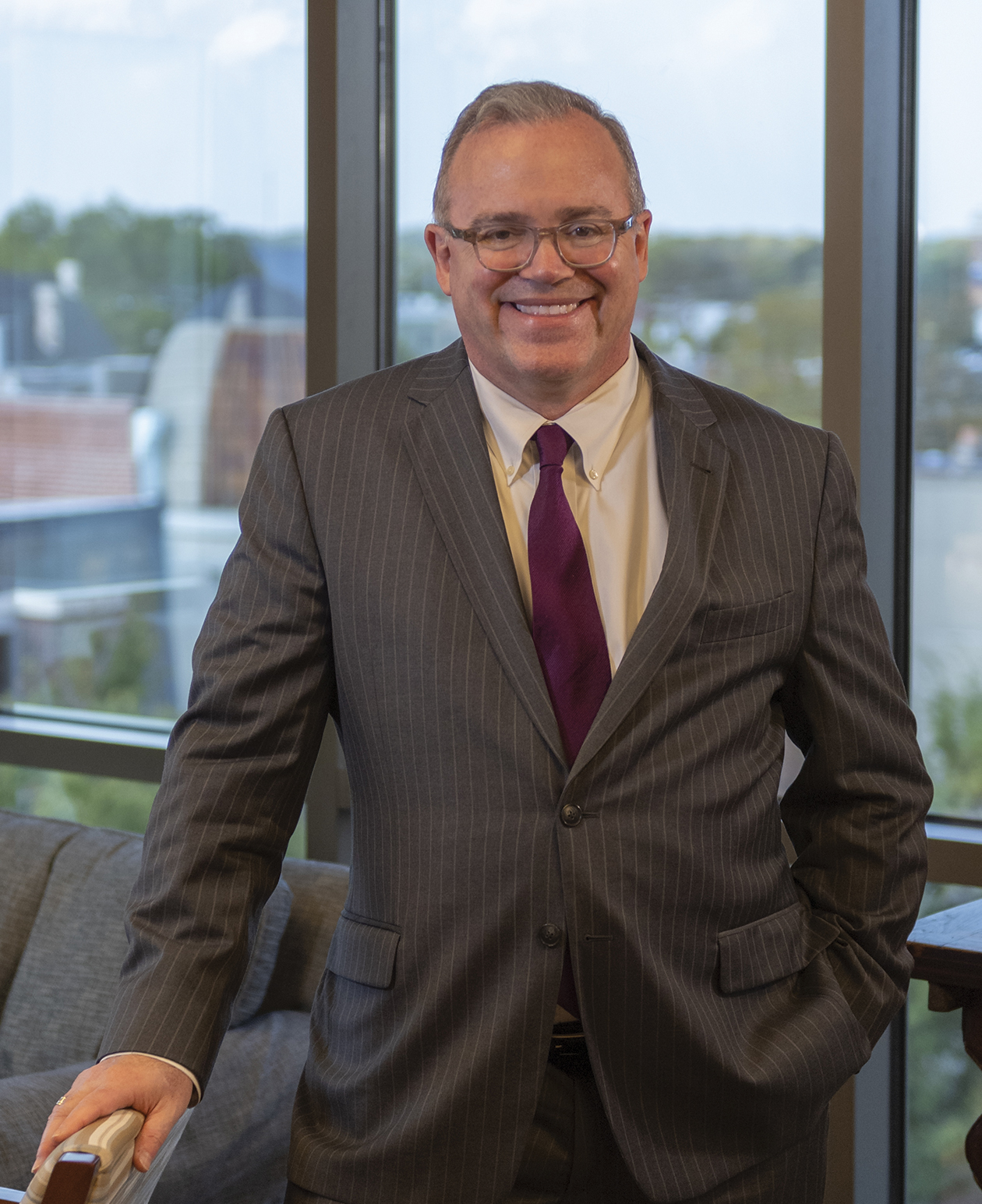 As Dr. Robert Findling closes out his first five years as VCU’s Chair of Psychiatry he looks back with pride, and forward with enthusiasm. He doesn’t take credit for much. Everything is the work of the Department, and the Department is the people.
As Dr. Robert Findling closes out his first five years as VCU’s Chair of Psychiatry he looks back with pride, and forward with enthusiasm. He doesn’t take credit for much. Everything is the work of the Department, and the Department is the people.
Dr. Findling assumed the Chair in January 2020, and as he puts it, a few months later the job for which he was hired evaporated. In that unprecedented first test of his leadership, the people of the VCU Psychiatry Department rose to the occasion, responding in ways that actually increased outpatient services at a crucial moment when access to almost everything else was restricted. “A lot of people were slowed down, we sped up,” he says. From there, the Department kept going, almost doubling the amount of NIH funding[i] it receives, substantially increasing the number of patients served, increasing applicants to over 100 for each slot in the general psychiatry residency program, and initiating community-based endeavors like those offered through the Cameron K. Gallagher Mental Health Resource Center. Dr. Findling emphasizes that, “none of this happens without really dedicated people – and my job is to organize the team in a way that they have the best chance of succeeding.”
In all of Dr. Findling’s answers about his current role, behind any nuance or particulars, there is one fundamental: the reason for the Department of Psychiatry to exist is to simply make the world a better place. This view has defined his career from the beginning. When he entered his 3rd year psychiatry rotation here as a VCU medical student, he had no intention of becoming a psychiatrist. But that experience changed everything. “You could do more,” he says, “The ability to make a difference was greater.” “There was no decision to be made.” In returning to chair the department that altered his trajectory after being away for several decades, Dr. Findling intentionally avoids a top-down approach – except in aligned purpose. “People in this department are aspirational and want to make a difference.” “People make the organization,’ he adds, “this is about as mission oriented a place as you’re ever going to find; good enough is not good enough for so many of us.”
If you want to make the world a better place, the next natural question is, how? Dr. Findling says he’s lucky because there are so many ways to go about that, if you start with a team built around that shared purpose. “One of the things that I wanted to bring was greater access, and if you want to bring greater access you want to have a complimentary group of people, because if you only focus let’s say on the most severely harmed, the most profoundly disabled you’re forgetting so many more people. So, what we really wanted to do is to bring people with different skill sets, different levels of expertise, that are complimentary and bring a team together.”
This interdisciplinary approach extends outside of the Department to numerous collaborations across the medical school, VCU as a whole, and other institutions around the globe. From the school of social work, humanities and sciences, engineering, nursing, health professions, and more; the Department’s collaborations clinically, educationally, and research-wise are far reaching both within VCU and all over the world. According to Dr. Findling, “psychiatry is a great profession because it’s a team sport.” And when asked about which collaborations he would like to expand, “I don’t want to sound glib, but all of them.” “The hard part,” he says, “is paying attention to what’s right in front of you while still looking forward so you don’t miss opportunities. The fear of missing out is a major part of the way I think about my responsibilities.”
That seeker mentality flows quite naturally from Dr. Findling’s research, where he has excelled at not settling for status quo, focusing on – amongst other things - how to better categorize, and thus better treat children with AIR (Aggression with Impulsivity and Reactivity[ii]). Because while taking care of the here and now is of utmost importance, Dr. Findling points out that you must simultaneously be striving to do better. That’s where the Department’s research comes in. Though he admits, “I’m always a little leery because sometimes research sounds very scientific and somewhat not-inspiring and from my perspective research is basically saying, you know, maybe we can do what we can do, better.”
A career’s worth of experience might be why he is so devoted to supporting the research of junior faculty members. “Doing research is very difficult, and it’s always been very difficult. People early in their careers often times are very vulnerable because they’re just starting out and the challenges are great. And so, what we try to do is identify people who are early in their careers, who could work anywhere, and give them a place where they can thrive and succeed and be nurtured and have their careers developed in a thoughtful way in a department that again, strives and achieves excellence while still remaining compassionate and thoughtful and supportive.”
For anyone familiar with the way he centers humans in the Department’s story, it's no surprise that it’s the people Dr. Findling is the proudest of when he reflects on 2024. He points to faculty members’ successes and that clinical services have been remodeled to provide access where they never had it before. “I am really proud of how our department has been able to expand its mission. We’ve been able to grow our team with new outstanding members whilst retaining the remarkable faculty we already have in place. This department is full of extraordinary people who could work anywhere, but choose to work here in Richmond.”
His anticipation for 2025 is equally people-focused. “I’m excited about even further expansion. People are eager to work here and join us in unprecedented numbers. I anticipate that great recruitments are going to enable us to accomplish even more. And that will lead to new outstanding achievements across the academic missions of clinical care, teaching, and research.”
And when asked to set that researcher’s gaze 5- 10 years in the future, he begins by touting the already impressive caliber of the Department, “We’re naturally modest at VCU, maybe it’s a southern thing – you don’t want to beat your chest too loudly, but you don’t want to be so modest that people think you shouldn’t be invited to the ball.” Dr. Findling definitely thinks the Department is worthy of attention.
“The mission is so great. We are lucky enough to be in an academic medical setting. That will afford us the opportunity to advance the field of Psychiatry. We’re going to make those advances by accumulating new knowledge and conducting meaningful research that will make a positive impact in people’s lives. I can’t wait to see what we’ll be able to achieve- and what we will learn. The research we wish to conduct will have the most powerful impact when we continue to bring the most talented people in the world into the Department.”
This vision requires a commitment to the people that constitute the Department. “To achieve that goal we need to: 1) continue to provide a supportive environment for the most promising early career faculty members; 2) ensure we also recruit accomplished mid-career scientists who will serve as pillars upon whom we can rely to help us build new, innovative programs, and; 3) ensure we provide the tools necessary to our current and future faculty in order to ensure they continue to achieve at the highest levels.”
In charting an expansive course for the Department, Dr. Findling stays true to the most basic reason for the work. “Patients with psychiatric conditions are often marginalized, stigmatized, denigrated. We can make such a difference and my job is to take great people and give them a chance so that they can do exactly what they need to for people who are marginalized and vulnerable. It’s a great job, I have a great job.”
Dr. Robert L. Findling, M.D., M.B.A. is Chair of the VCU School of Medicine Department of Psychiatry and a C. Kenneth and Dianne Wright Distinguished Chair in Clinical & Translational Research.
Dr. Findling did his undergraduate work at Johns Hopkins University and went to medical school at Virginia Commonwealth University. Dr. Findling then completed training in Pediatrics, Psychiatry, and Child & Adolescent Psychiatry as part of the “Triple Board” joint training program at Mt. Sinai in New York. He subsequently earned his Masters of Business Administration degree at a joint program run by the London School of Economics, NYU Stern, and École des Hautes Études Commerciales de Paris.
Previously Dr. Findling served as the Director of Child and Adolescent Psychiatry at University Hospitals of Cleveland, Director of Child and Adolescent Psychiatry at Johns Hopkins, and as Vice President for Psychiatry Services and Research at the Kennedy Krieger Institute.
He has received both national and international recognition as a clinical investigator and author, is a recipient of the Norbert and Charlotte Rieger Award for Scientific Achievement from the American Academy of Child & Adolescent Psychiatry, and has been cited more than forty-six thousand times as of the end of 2024.
[i] As of this publication, NIH had not released its official compilation of 2024 awards. Current NIH rankings can be found by visiting The Blue Ridge Institute for Medical Research (BRIMR).
[ii] For more from Dr. Findling about AIR and other topics, listen to his conversation with Dr. Thea Gallagher, PsyD on the NYU Langone Insights on Psychiatry podcast. Full episode available here, on YouTube, and most podcast services.
VCU and VAMC Research Partnerships Boost Veteran Mental Health Care
VCU works year-round to improve the lives of veterans through collaborations with the Richmond Veterans Affairs Medical Center (RICVAMC). From monthly joint research meetings to ongoing studies, the relationship advances veteran mental health care in Central Virginia and beyond.
11/8/2024
By C.F. Orrison
 As one of the faculty members with appointments at both institutions, Dr. James Bjork’s ongoing research benefits from this partnership. A key way he leverages the strengths of each institution is with referral protocols for research. Dr. Bjork points out that studies indicate veterans treated at the RICVAMC are more likely to have mental health issues and other associated challenges than veterans who are able to obtain private insurance from steady employment. The VA’s ability to precisely gauge feasibility and identify potential participants for studies within their large patient base, together with VCU’s administrative support for funding and research focused infrastructure, enables research to be both targeted and flexible.
As one of the faculty members with appointments at both institutions, Dr. James Bjork’s ongoing research benefits from this partnership. A key way he leverages the strengths of each institution is with referral protocols for research. Dr. Bjork points out that studies indicate veterans treated at the RICVAMC are more likely to have mental health issues and other associated challenges than veterans who are able to obtain private insurance from steady employment. The VA’s ability to precisely gauge feasibility and identify potential participants for studies within their large patient base, together with VCU’s administrative support for funding and research focused infrastructure, enables research to be both targeted and flexible.
VCU faculty are collaborating with the RICVAMC on a number of studies related to pharmacology and medical technology. For example, Dr. Bjork is conducting a clinical trial of the transdermal medication rotigatine on outcomes for veterans with cocaine use disorder. The trial looks at whether this dopamine system treatment, which is indicated for Parkinson’s and restless leg syndrome, can help patients attain sobriety – as well as if the medication changes how the brain communicates with itself. For this aspect, the research benefits from cutting edge MRI at VCU’s Collaborative Advanced Research Imaging facility. Through an additional partnership with Cures Within Reach, this study is also able to extend further into the community and engage veterans both at the VA and those that do not qualify for, or do not utilize, VA services.
Along with Dr. Jarrod Reisweber, Dr. Bjork has been working on Virtual Reality (VR) addiction therapy utilizing Transcending Self Therapy, and specifically The TST Retreat. The technology allows participants to practice techniques and concepts from in-person therapy in a VR world. Veterans who opt to receive VR kits are more likely to complete treatment, and the program has gained popularity and expanded to pilot sites beyond Virginia.
Dr. Bjork is also conducting a study to understand motivational biases in veterans who, despite VA and DOD guidelines, are still prescribed and taking opioids for chronic pain. Using incentivized games which participants access on their own devices, this decision-making study employs technology to understand factors in how these veterans think and prioritize. The hope is that this data will in turn provide insights that help providers successfully broach the difficult topic of transitioning patients to a safer long-term treatment.
The mental healthcare challenges faced by our veteran community are vast, and the VA works diligently to provide clinical treatment and applied research for a diverse population. With researchers like Dr. Bjork, VCU Psychiatry contributes a vital descriptive research component that amplifies veteran care now and for the future.
Dr. James Bjork, Ph.D. is Professor of Psychiatry at the Institute for Drug and Alcohol Studies at VCU with affiliate appointments in Pharmacology and Toxicology and Physical Medicine and Rehabilitation; Research Health Scientist at U.S. Department of Veterans Affairs.
Jarrod Reisweber, Psy.D. is Affiliate Assistant Professor, Department of Psychology VCU College of Humanities and Sciences; Clinical Psychologist at U.S. Department of Veterans Affairs.
VCU Psychiatry’s Dr. Kelsey Hagan Advances Collaborative Eating Disorder Program
Cross-Departmental Initiatives to Bring Evidence-Based Care to Historically Overlooked Patients
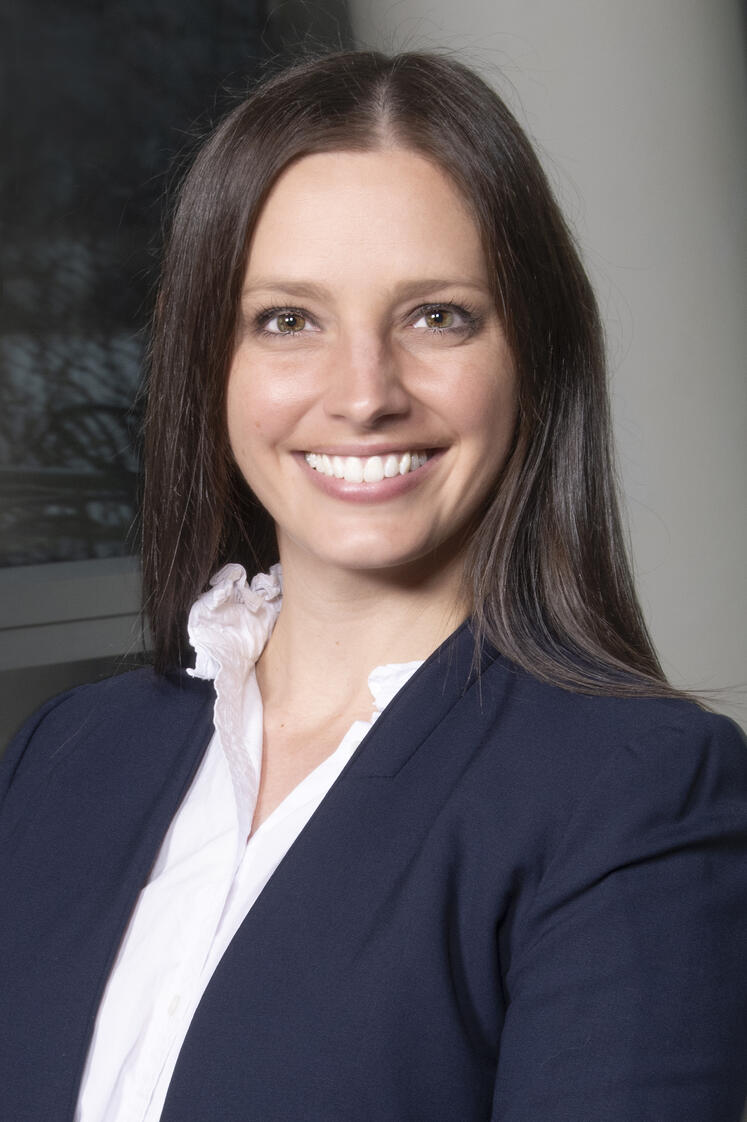 By C.F. Orrison
By C.F. Orrison
Eating disorders (EDs) kill someone every 52 minutes in the US. Among mental illnesses, only opioid use disorder is deadlier. Yet, it is estimated that only 10% of people with eating disorders get treatment. Through a new collaborative cross-departmental program, Dr. Kelsey Hagan in VCU School of Medicine’s Psychiatry Department and Dr. Ann Haynos from the university’s Psychology Department, aim to provide lifesaving research, training, and evidence-based treatment to this underserved population.
Like many, Dr. Hagan was first exposed to EDs in adolescence. Though they didn’t use clinical terms, she was aware of fellow dance students who talked about and engaged in behaviors associated with anorexia nervosa and bulimia nervosa. Witnessing this among her peers sparked a compassionate curiosity in her. A simple question: why someone would go to such extremes to control their body, eventually led Dr. Hagan to focus her career on EDs, primarily in adolescents. But beyond her extensive knowledge in the field, and all the highly technical research and clinical data she has collected, Dr. Hagan learned something she wasn’t even looking for. She discovered just how overlooked and disregarded eating disorders are.
For people living with eating disorders, the barriers to treatment can be multi-fold. First, the illness must be identified, and the misconceptions around EDs are so widespread there’s an acronym for them. SWAG stands for Skinny White Affluent Girl. In reality, eating disorders affect everyone regardless of race, ethnicity, gender, or socio-economic background. While women, girls, and people assigned female at birth do tend to exhibit a higher prevalence of eating disorders and disordered eating, rates of EDs in males are increasing at a faster rate than for females. Eating disorders are also not solely an affliction of the wealthy. Dr. Hagan points out that food insecurity is a big risk factor for EDs, and unlike VCU Health, many providers within the community do not accept patients with Medicaid or Medicare.
Implicit biases about what an ED looks like can also play a factor for providers. People of color with eating disorders are half as likely to receive a diagnosis or treatment than their white counterparts; and contrary to what many picture, fewer than 6% of people with an ED are underweight. People in larger bodies are actually more at risk of utilizing unhealthy weight control behaviors, and 2.45 times more likely to engage in disordered eating, yet half as likely to receive an eating disorder diagnosis.
Another fatal misconception is that EDs are very rare, but as Dr. Hagan emphasizes, “eating disorders are more common than autism, they are more common than schizophrenia, they’re not a niche disorder.” Yet historically, EDs haven’t garnered a proportionate level of attention from researchers and medical schools. Dr. Hagan sees a lack of training and knowledge as a hurdle to providers identifying eating disorders, and knowing what to do once they have.
People going undiagnosed and untreated due to misconceptions and lack of training can cause years of suffering. Dr. Hagan reports adult patients with binge eating disorder who have exhibited symptoms since childhood but never knew it was a condition for which they could get treatment – instead thinking it was their own lack of willpower and self-control. She also sees adolescents who only find their way to her after extensive GI testing, and patients whose purging was met with such shaming that they learned to hide their illness until the physical toll became evident. All of this is what drives her ambition for VCU’s Eating Disorder Program.
Envisioned as an interdisciplinary collaborative effort, the new program seeks to elevate research and clinical offerings in this worthy field. For Drs. Hagan and Haynos, research and clinical approaches inform each other, and the program has several studies currently underway or about to launch. For example, jointly Dr. Haynos and Hagan are investigating neurobiological risk factors for eating disorder development in teens with a parental history of an ED.
Their individual pursuits also complement each other to further a comprehensive and well-rounded focus for the program. For instance, Dr. Hagan is especially interested in binge-eating pathology. To this end, she is conducting a study that investigates attitudes toward risk-taking in teens and young adults with bulimia nervosa and is working to launch a study that will use machine learning to identify predictors of loss-of-control eating in teens. And Dr. Haynos is especially interested in restrictive eating pathology. Accordingly, she is currently evaluating a novel relapse-prevention treatment for adults with anorexia nervosa and conducting another study that examines the shared and distinct mechanisms of anorexia nervosa and obsessive-compulsive disorder. Across the spectrum of EDs, in a basic sense, the core interest of the program is in how lab-measured indices impact real-world behaviors, and how that can impact clinical practice.
As the program grows, this evidence-based approach will provide even more benefit to patients, residents, and students. At present, the clinical capacity of the program is very limited; however, there are plans to expand over time. Within the next year, the program will be hiring a post-doctoral fellow who will help build up clinical services and bolster the research mission. Drs. Hagan and Haynos also hope to add a full-time clinician educator to manage program development and clinical supervision. This would allow the program to increase training opportunities for master’s level clinicians and postdocs, as well as expand to provide yearlong rotations for graduate students from the Monroe Park campus.
Tiers of care are also top of mind. While outpatient services like those provided by the clinic are the preferred method of treatment, some patients need a higher level of care. Currently, for adolescents who need inpatient treatment, there are no options in the region, and families can face the daunting prospect of sending their child out of state for care. To address this, Drs. Ekaterina Stepanova, MD, PhD, a child and adolescent psychiatrist, and Jarrod Leffler, PhD, ABPP, a child and adolescent psychologist, of VCU Health’s Virginia Treatment Center for Children (VTCC) at Children’s Hospital of Richmond (CHOR) are consulting with Drs. Hagan and Haynos to create a family-based partial hospitalization program for adolescents with EDs and their families in a structured and supportive therapeutic environment. Ultimately, Dr. Hagan hopes to further round out services by expanding upon CHOR’s eating disorder protocol by establishing a medical stabilization unit to provide specialized care to children suffering from the dangerous physical effects of EDs.
By working collaboratively across VCU, Drs. Hagan and Haynos look to harness the potential of an interdisciplinary approach that integrates research within all levels of clinical work. With this bold vision for the future of evidence-based eating disorder care, VCU aims to advance academic and treatment options to help bring these complex conditions out of the shadows.
Assistant Professor Dr. Kelsey Hagan, Ph.D. is an NIH BIRCWH K12 Scholar who completed undergraduate studies in psychology at Emory University and holds a Ph.D. in Clinical Psychology, with a minor in Quantitative Psychology, from the University of Kansas. She completed a doctoral psychology internship in Clinical Child Psychology at Packard Children’s Hospital at Stanford University and Children’s Health Council Consortium and an initial year of postdoctoral fellowship at Stanford University in the Child and Adolescent Eating Disorders Program. Dr. Hagan was a NIMH T32 funded postdoctoral research fellow in the Eating Disorders Research Unit within the Department of Psychiatry at the Columbia University Irving Medical Center and the New York State Psychiatric Institute.
A VCU Health psychiatrist explains how exercise and the outdoors can affect mental health and well-being.
It may only take one small step to get on the path to improving your mental health.
Some people started taking that step after coming across a comedic TikTok video of a woman begrudgingly forcing herself to go on a walk around her snowy neighborhood when she was angry.
Amassing millions of views, the stupid walk for stupid mental health trend, also known as #StupidWalkChallenge on TikTok and Instagram, is a goofy way to motivate people to go outdoors as part of their selfcare routine.
Between physical activity and sunlight, Matthew Way, M.D., a psychiatrist at VCU Health, says there is countless research backing up the benefits a walk can have on mental health.
“When we are immersed in natural environments, we can be more present here and now. Then, we may find the opportunity to fully realize the interconnectedness that is reality, which we easily miss when we are consumed with the usual daily tasks of life,” Way said.
Way spoke with VCU Health News about the mental health benefits of exercise and the science behind these changes in mood.
Inaugural Community Day a Success
Thank you to everyone that helped make the inaugural Community Day this past Saturday a tremendous success!
On Saturday, July 20, from 1 p.m. to 4 p.m. community members gathered at Martin Luther King Jr. Middle School to learn about the different mental health resources available to them. They also had the opportunity to enjoy live music, food trucks, face painting and wellness activities.
Researchers at VIPBG at VCU are are deepening the public’s understanding of the impact of substance abuse
Since scientists first mapped the human genome approximately 20 years ago, a steady current of genetic information and resources have entered the mainstream. From predicting a patient’s likelihood of experiencing side effects from a medication to geolocating one’s DNA origins, today a quick swab can produce a slew of data helpful to understanding human health.
But what if the genetic question is more nuanced, difficult to parse and related to potentially life-threatening conditions like psychiatric illness? Searching for those answers is what drives Alexis C. Edwards, Ph.D., and Brien P. Riley, Ph.D., researchers at the Virginia Institute for Psychiatric and Behavioral Genetics (VIPBG) at VCU who investigate substance abuse, suicide and schizophrenia.
Dr. Thakre and VCU’s Brain Stimulation Program Bring the Future of Neuromodulation to Patients
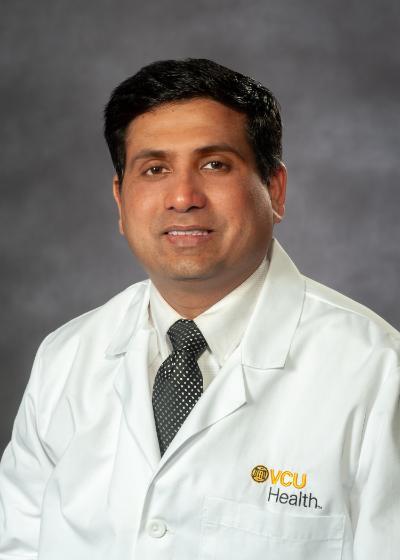 By C.F. Orrison
By C.F. Orrison
Dr. Tushar Thakre believes it is important to directly address the stigma surrounding neuromodulation, specifically ECT, because its reputation does a disservice to patients suffering from some of the most debilitating conditions. He says misperceptions can deter patients from seeking help, “they’re afraid of the treatment and they don’t want to feel like they’ll get worse.” Neuromodulation does come with some risk, but it also offers relief to people with treatment resistant disorders who have not responded to other medications and therapies. In Dr. Thakre’s view, taking time to appropriately match patients with treatments increases the efficacy and decreases the likelihood of negative effects.
It is this ability to help the sickest and most vulnerable patients that led Dr. Thakre into psychiatry in the first place. With an interest in both research and clinical medicine, he takes a biological approach to illness and found neuromodulation to be a powerful option for patients. It is also an exciting field. In addition to new emerging technologies, it is, as Dr. Thakre puts it, “the interventional aspect of psychiatry.”
With depression ranking as the leading cause of disability worldwide, Dr. Thakre and the VCU Brain Stimulation Program are harnessing technology to deliver real results for some of the toughest cases. The program currently offers both ECT and TMS treatments. Though both fall under the umbrella of neuromodulation, they are very different from each other in practice.
ECT, or Electroconvulsive Therapy, is one of the strongest treatments in psychiatry. It has been around for about a hundred years, and though it has a brutal reputation in media and legitimately scrutinized history, ECT was originally developed as a more humane option to treatments like Metrazol injection and insulin coma therapy. In its modern form (and standard since the mid 20th century) ECT is received under anesthesia with the aid of a paralytic agent. This ensures that a controlled therapeutic seizure can be induced without direct physical or mental distress to the patient. It does come with risks, primarily short-term memory issues around the time of treatment, which is why patients are carefully selected and supported with wrap-around services. Because of our societal perceptions and the highly involved process, the prospect of ECT can seem daunting, but according to Dr. Thakre, “it can be life changing for many people.”
Related, but very different, TMS is on the forefront of neuromodulation. Short for Transcranial Magnetic Stimulation, TMS uses magnets similar to what many are familiar with in an MRI. But rather than capturing images, the magnetic field causes electrical stimulation of the brain. Currently VCU has two TMS machines and offers both “Superficial” TMS which uses the original figure-eight coils, and “Deep” TMS which uses H-coils. Though slightly less penetrating than the deep TMS device, treatment with the classical TMS machine can be more targeted and is cleared for pediatric patients. Deep TMS penetrates further and wider into the brain tissue and is currently only for use in adults. Both offer non-invasive treatment for patients with serious illness for which medication and therapy are not working. Unlike ECT, TMS is performed without sedation and therefore does not require the same level of post-treatment care or come with secondary needs like transportation. The patient is awake, alert, and simply sitting in a chair. Because of this, TMS treatment can be received as part of a person’s normal day.
The Deep TMS machine uses what many call “helmets” to administer the treatment. Each helmet is specially designed to target different areas of the brain depending on the treatment. VCU currently uses the modules for major depressive disorder, anxious depression, and OCD. TMS is also cleared for smoking cessation, musculoskeletal pain, and migraine; and Dr. Thakre hopes to be able to add additional machines and treatment modules to the program. He wants the program to expand for both better patient access and to increase the program’s research potential.
The possible applications for TMS both within and beyond psychiatry are expansive. Globally research is being conducted related to a host of conditions ranging from addictions to Alzheimer’s; bipolar disorder to fibromyalgia; PTSD to cardiac arrythmia; eating disorders to Parkinson’s. Long-term, as more treatments become available Dr. Thakre sees opportunity for the field of neuromodulation to expand into a full subspecialty with fellowship programs. In the immediate, he says every student and resident should have a working knowledge of these techniques because of the significant improvement they provide patients. “They actually feel hopeful for the future.”
Associate Professor Dr. Tushar Thakre, M.D., Ph.D. trained at Government Medical College, Nagpur and holds a Ph.D. from University of North Texas Health Science Center. He completed his residency in Psychiatry at University of Missouri, Kansas City, and a fellowship in Sleep Medicine at the Cleveland Clinic. He serves as Division Chief and Medical Director, Adult Acute/Inpatient Psychiatry and Neuromodulation; and Staff Physician, VCU Center for Sleep Medicine.
VCU Psychiatry Addictions Division Chief, Dr. F. Gerard Moeller, Leading Creation of Virginia Opioid Abatement Toolkit to Aid Localities in Fight Against Overdose Crisis
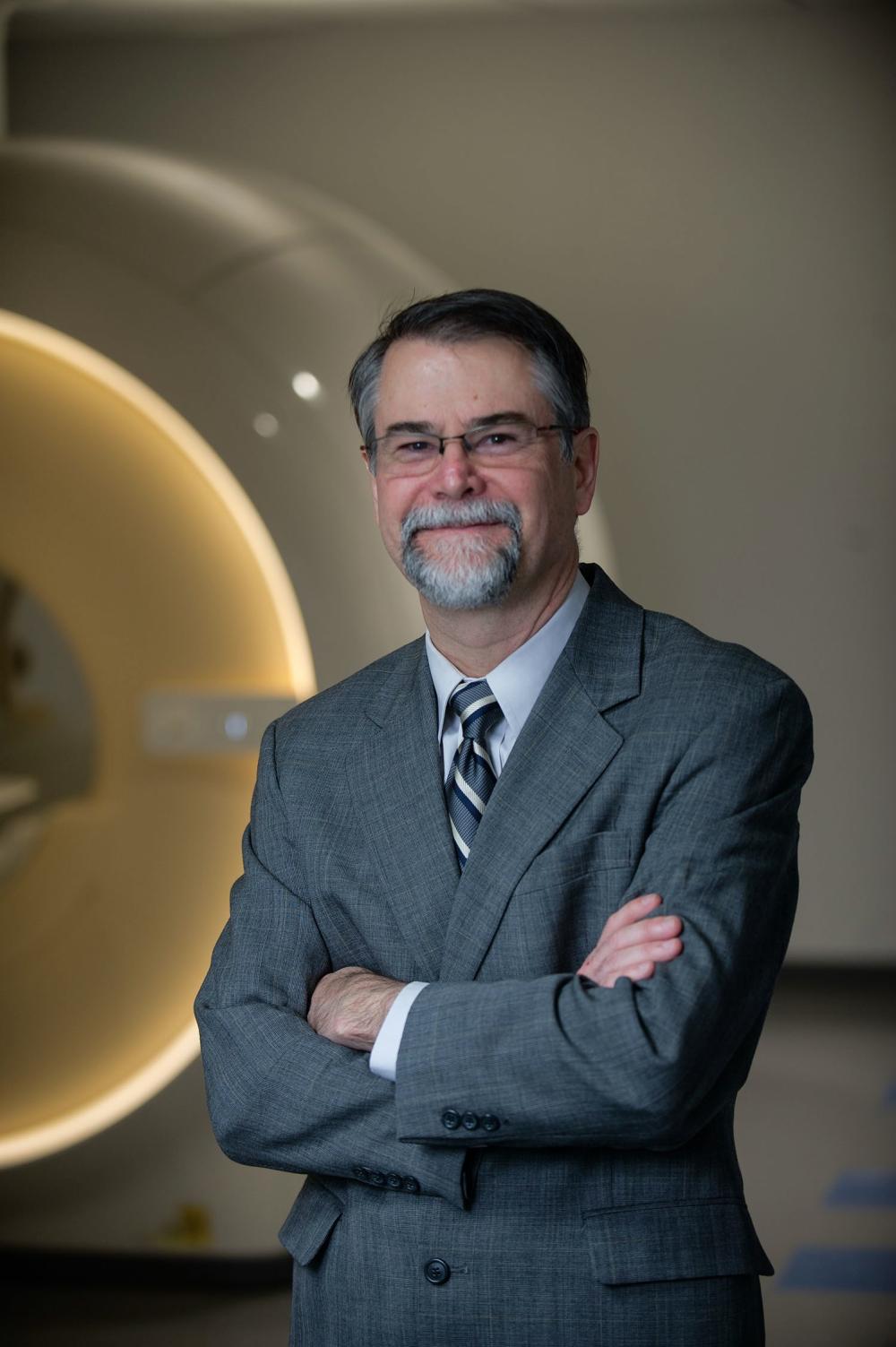 By C.F. Orrison
By C.F. Orrison
It was Dr. Gerry Moeller’s interest in the neurobiology of behavior, specifically impulsivity and impulsive behaviors, that first led to his work in the addiction space. Now, as VDH data shows emergency departments across the Commonwealth treat over 22 thousand drug overdoses a year with an average of seven Virginians dying a day, Dr. Moeller is using his vast experience to help localities navigate the “how” of saving lives.
In 2021 the General Assembly established the Virginia Opioid Abatement Authority (OAA) to oversee distribution of the majority of an expected $1.1 billion dollars in settlement funds from litigation against manufacturers, distributors, and pharmacies alleged to have contributed to the opioid epidemic.
Thanks to an OAA grant to VCU’s Wright Center for Clinical and Translational Research, Dr. Gerry Moeller is working with a team from the Wright Center’s community engaged research program to create an online Toolkit to inform communities about evidence-based methods for using this funding in the prevention and treatment of opioid use disorder. In addition to being a place where cities and counties can find information and resources, a part of the Toolkit will be providing consultation using local level data that can inform decisions down to the zip code.
Still in process, Dr. Moeller sees the Toolkit as a living document that will evolve from engagement with communities. As localities put evidence-based practices in place they produce more data that can continue to improve implementation and outcomes. Through the Toolkit, Virginia’s counties and cities will be able to learn from each other and make connections with municipalities who have seen success.
This type of resource is vital. The US loses over 100k people a year to overdose deaths, and the vast majority involve opioids. With lives on the line, cities and counties are tasked with allocating funding in a space in which Dr. Moeller points out they have varying degrees of expertise. Indeed, there has been national concern and reporting on how municipalities are allocating settlement funds. By providing guidance on evidence-based methods with locality specific data and consultation, the Toolkit will help educate communities on topics like Medications for Opioid Use Disorder (MOUD).
“Research has clearly shown that if you’re on one of these medications your risk of overdose death and all-cause mortality is reduced if you have opioid use disorder. The bottom line is these medications save lives. So, we need to get people on these medications,” says Dr. Moeller. However, he points out, it’s not as simple as writing a prescription; and while the number of MOUD providers has increased there are still communities that may not have a single one.
Dr. Moeller is passionate about closing the gap between need and access. “When we identify people who are at high risk of overdose, we need to connect them up with treatment right away, because every day that they are without treatment is a day where they could die from a drug overdose.” His words are not hyperbolic. The third wave of the overdose crisis, which is characterized by synthetic opioids like fentanyl, is still ongoing. And now, we are in what is being called the fourth wave, with polysubstance overdoses involving synthetic opioids mixed with stimulants rising significantly.
A recent study found that by 2021 nearly half of fentanyl overdose deaths in Virginia involved stimulants. With fentanyl showing up in counterfeit pills and non-opioid illicit drugs, Dr. Moeller warns that every drug use could be fatal. As localities combat an evolving threat, flexible projects like the Toolkit can provide access to lifesaving resources and tactics.
For example, Dr. Moeller says, “You can engage people in treatment even if they did not come into the emergency room seeking treatment. There are ways to do this that are evidence-based, and we know that they work.” Part of the Toolkit is to give localities examples of how that’s been done by other cities and counties, like VCU’s first in the Commonwealth Virtual Bridge Clinic. Such information sharing is key because we will not solve this crisis by operating in silos.
Working with communities and collaboratively across disciplines in this way is familiar to Dr. Moeller and is at the intersection of his roles as Director of both the Wright Center for Clinical and Translational Research and the Institute for Drug and Alcohol Studies.
He puts it simply, “The way you have an impact in this space is by working with the communities.” The Toolkit is a way to do just that by engaging in a cycle of providing evidence-based guidance and ongoing data collection. With this effort VCU is building on its recognized work in the field and helping Virginia chart a thoughtful approach to opioid abatement.
Dr. F. Gerard “Gerry” Moeller, M.D. is Director, Wright Center for Clinical and Translational Research; Director, Institute for Drug and Alcohol Studies; Associate Vice President for Clinical Research; Chief, Department of Psychiatry Addictions Division; Adjunct Professor, Department of Pharmacology and Toxicology; Adjunct Professor, Department of Neurology.
2023 report, not reflected on VDH website https://www.vdh.virginia.gov/content/uploads/sites/18/2024/05/Quarterly-Drug-Death-Report-FINAL-Q4-2023.pdf
VCU Psychiatry Launches Geriatric Program Amid Global Aging Crisis
Dr. Antonia Swink Leads the way on VCU Psychiatry's Geriatric Program

By C.F. Orrison
The World Health Organization estimates that by 2030 one in six people will be age 60 or older. That segment of the global population is expected to further double by 2050. Sometimes called the graying of America here in the US, every community must work to adapt to the increased proportion of elderly members.
To improve the lives of older people, their families, and communities, the UN Decade of Healthy Aging (2021-2030) highlights four areas of focus. One of those areas is integrative care. VCU Psychiatry is embracing that challenge with the Geriatric Psychiatry Program spearheaded by Assistant Professor Dr. Antonia Swink.
Recently recruited to VCU, Dr. Swink was educated at Howard University and Hunter College before pursuing her MD at St. George’s University. She performed her residency at Cooper Medical School of Rowan University and completed the Geriatric Psychiatry Fellowship Program at Icahn School of Medicine at Mt. Sinai.
Dr. Swink first became interested in Geriatric Psychiatry because of the love and value she holds for society’s elders. She saw a population that was vulnerable and in need of people who were trained specifically in geriatric psychiatry to provide more specific and higher quality care.
She finds her work highly rewarding because of its challenges. When patients come in, they have years of life and so much history behind them, and often multiple medications and comorbidities onboard. It’s a delicate balance of care that can include the patient’s family as well.
She says that people in this age group are experiencing so many changes in their lives: medical conditions popping up, retirements, changes in finances, changes in the dynamics of their home, friends and family that may be passing away. “It’s really important to understand that this group of individuals have reached this point in their lives where there are multiple different physiological schemes and changes that are taking place that impact both physical and mental health. There are a lot more complications involved there, and so what we are committed to in geriatric psychiatry is having a comprehensive approach.”
This comprehensive approach includes providing a combined psychotherapy and psychopharmacological strategy with the aim of expanding to incorporate a kaleidoscope of care. Such care could include case management and collaboration with dieticians, speech therapists, and occupational therapists to help collect data and promote whole body health. There could also be great opportunities to screen for sleep disorders, provide newer drugs through infusion, and build on research around TMS and agitation in Alzheimer’s.

From a research standpoint, the program also hopes to help fill a need. According to Dr. Swink, “There’s a huge gap where a lot of research studies are missing or scant when it comes to, does this work for the geriatric patient, do these criteria even apply in this age group?”
With the high levels of demand expected, the region is going to need a very comprehensive but efficient scope of services banding together to meet the needs of the community. Currently the Geriatric Psychiatry program offers students and residents valuable experience honing their skills to help grow the number of providers with specialized training in treating this population.
The dream is to expand into something that mirrors VCU’s wonderful program and scope of services for children and adolescents with psychiatric symptoms. Building into something like that would be spectacular for patients who in Swink’s experience are so grateful to be heard and listened to. Grateful that they’re cared about and not discarded.
All this might sound ambitious but as Dr. Swink puts it, she feels lucky to be with a tremendous group of colleagues at VCU where, “If there is a passion, if there is a vision, let it be known and it will be supported.”
Just as we have lengthened the human life span, we must also ensure that longer lives are better lives. The Geriatric Psychiatry Program is committed to providing specialized psychiatric care within a comprehensive and integrative model aimed toward better aging. This approach contributes value to not just VCU Health System but also the larger community. As they serve patients, train future providers, and advance the field, Dr. Swink and her colleagues help make life better for an ever-growing segment of the population.
Our 2024 Top Docs
VCU Department of Psychiatry

Richmond Magazine has published its annual list of top doctors in the Richmond region. VCU Health is prominently showcased with nearly 250 providers featured among the 440 selected for the final list.
Congratulations to the 15 Department of Psychiatry providers who were recognized this year!
Meet our 'Top Docs':
Addiction Medicine
Megan Lemay
Caitlin E. Martin
F. Gerard Moeller
Brandon Wills
Psychiatry/Adult
Melissa Bui
James Levenson
Psychiatry/Child and Adolescent
Cheryl Al-Mateen
Robert Findling
Neil Sonenklar
Bela Sood
Psychology (Doctor of Psychology)
Melanie Bean
Laura Caccavale
Rashelle Hayes
Leila Islam
Stephan Weinland

